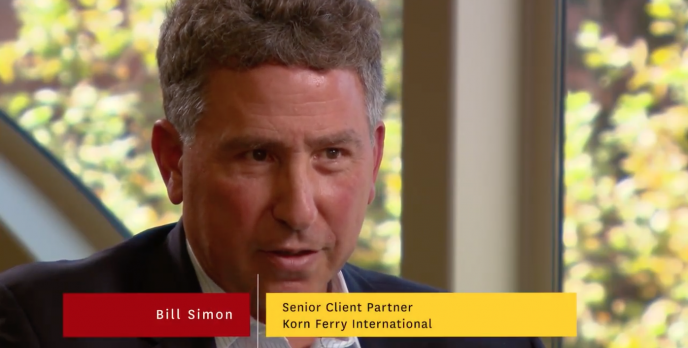Navigating a job search during a pandemic: Advice from Korn Ferry’s William Simon

Finding the right talent is not an easy feat, especially during a global pandemic. Similarly, finding a job during a pandemic is equally as challenging. As the virtual world begins to replace the in-person recruitment process, job candidates and recruiters must learn to adjust to the new normal. To understand how to do so, I had the pleasure of virtually chatting with William Simon, Senior Client Partner and Managing Director of the Media, Entertainment and Convergence sector at the global consulting Korn Ferry, to receive insights from an executive recruiter himself.
In the midst of a new search, Simon recalled facing a dilemma in March when the governor issued a statewide lockdown. Overcoming what he calls the “one yard line” in which the hiring search freezes despite having viable candidates, Simon quickly learned that virtual interviews would have to replace the normal process of meeting in person, having dinner and connecting personally.
“[The hiring process] has changed,” Simon said. “This whole notion of having to spend in person time with people is measured very differently today than it was eight months ago. So that necessity of having the dinner and having the cocktails afterwards, all of that has changed, those rules are out the window.”
As a global sector leader in the media and entertainment industry, Simon knows firsthand the importance of connecting in-person. With more than 30 years of experience as an executive recruiter, he’s placed dozens of candidates in companies such as WarnerMedia and Sony Pictures Entertainment, yet he welcomes this new virtual interface when it comes to recruiting and hiring for his corporate clients through Korn Ferry.
“Now, in some ways, it’s better,” Simon said. “It's actually more efficient, and it's less expensive … in some respects, it makes the hiring process more efficient.” The candidates don’t have to make multiple trips to meet employers and scheduling virtual interviews is often easier for the clients.
Since Korn Ferry is a global consulting firm with clients around the world, Simon was familiar with virtual interviews. He transitioned to using Zoom quickly and efficiently, and encourages both interviewers and interviewees to welcome the new opportunity with an open mind.
“We all have to show our adaptability and our flexibility and our willingness to roll with the punches and to deal with these things,” Simon said.
Adaptability moving forward
“We’re going to be in a constant state of flux and a constant state of change,” Simon said. “I believe that the people that are going to be able to be successful going forward are those that can adapt to the nature of constant and ongoing change.”
While emphasizing the need to be adaptable in such a virtual setting, Simon also acknowledges how difficult it is to do so.
“I think it's a challenge,” Simon said. “A lot of people are creatures of habit, but I think that if we're going to remain successful and competitive in going forward in this kind of world, then we're going to have to be able to adapt quickly and change rapidly.”
As an executive recruiter with vast experience, Simon iterates how adaptability is the base skill to help find a job during the pandemic. Yet, he also notes how both candidates and companies must not lose the discipline of understanding their markets, technology, and global relationships that are fundamental basics.
Connecting over zoom
In the recruiting process, personability and connection during the interview stage is key. Without the in-person interaction, it can be a great challenge to foster that relationship.
“That ability to relate to people, especially over zoom, requires a certain kind of skill,” Simon said. “You have to be a better communicator over zoom than you do in person.”
Though harder, Simon finds creating the engagement with interviewer or interviewee similar to being in-person, noting the importance of simply relating to that person whether being across the table or across the screen. Both situations require establishing common ground early in the conversation through strong dialogue, Simon said. The key in doing so, according to Simon, is to be a good listener.
“That ability to listen and let another person speak and to be able to take that in and react to it — you can digest it, you can agree with it, you can disagree with it — [is important],” Simon said. “But you have to be able to engage with it and engage with people.”
In addition to listening, Simon stresses the significance of storytelling when communicating in an interview, especially when the stories illustrate growth.
“The ability to tell stories of how one gets from A to B is much more impactful than just saying I got there,” Simon said. “The ability to also tell stories about what you've learned, not just from great successes, but by mistakes or by the failures, because we've all made mistakes … The ability to learn from those kinds of hiccups is very valuable.”
Power of networking
Once adaptability is grounded and that connection is fostered, Simon said the last tool is networking, and more importantly, having the resilience to keep networking through setbacks.
“It is a challenging employment market. That's kind of the reality that everybody's dealing with. I think what people need to do is if you're looking for a job, you have to expect that you're going to have to kiss 100 frogs, and by that, I mean, you're going to have to talk to 100 people,” Simon said. “You have to be resilient, you have to be organized, you have to be willing to kiss 100 frogs, and, and you have to be real — you know, really have realistic expectations as well.”

